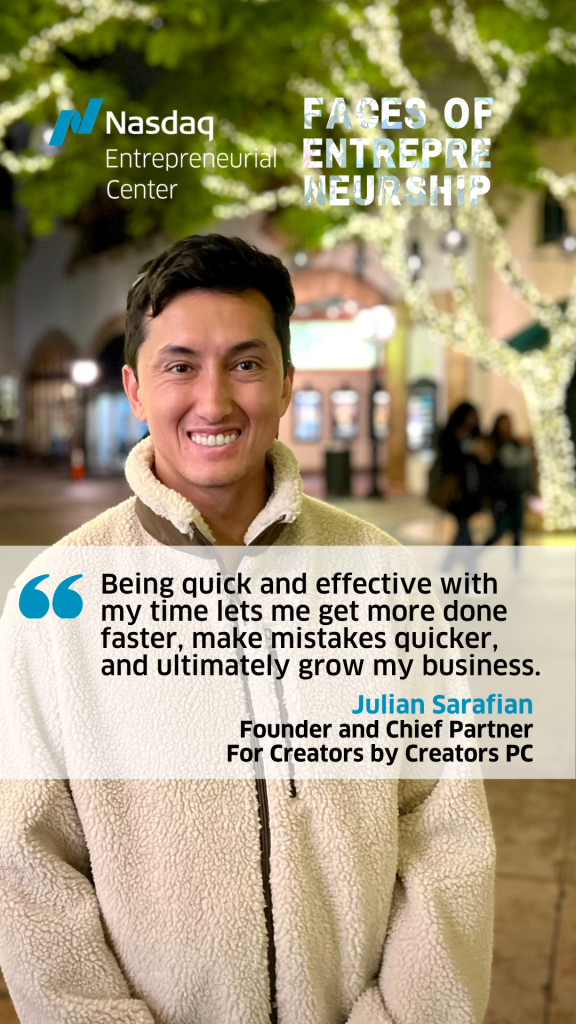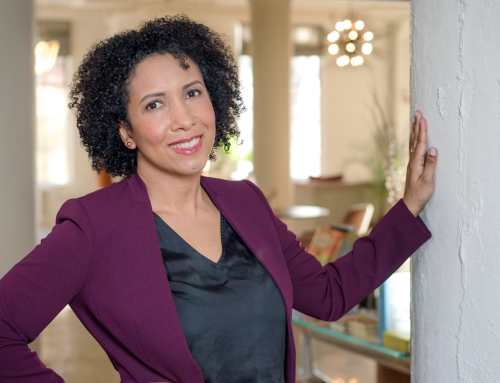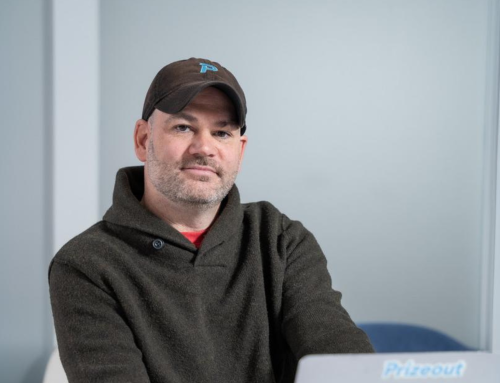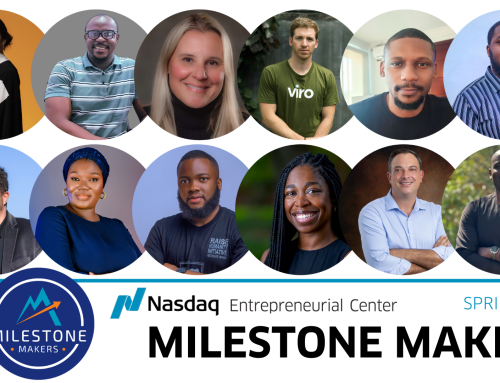Julian Sarafian is the Founder and Chief Partner of For Creators by Creators PC, the premiere law firm representing content creators and social media influencers. Julian founded the firm after becoming a content creator himself advocating for mental health on social media, where his cumulative following is nearly 350,000. Julian is an ex Biglaw attorney turned mental health advocate, content creator, and law firm owner. His advocacy has been covered by the New York Times, Bloomberg Law, CNBC, and the American Lawyer, among others. He is a graduate of Harvard Law School and UC Berkeley. Julian also writes for CNBC’s Make It and has two Tedx talks.
What does “entrepreneurship” mean to you?
 Julian Sarafian: It means going on an adventure to try to create something new. It’s not just about money, but also about the mission you believe in and having the courage to forge your own path.
Julian Sarafian: It means going on an adventure to try to create something new. It’s not just about money, but also about the mission you believe in and having the courage to forge your own path.
Tell us about your first experience with entrepreneurship.
JS: When I was in middle school I would make duct-tape wallets by hand. People saw mine and asked how I got it, and before I knew it, I was selling them for $5 a pop. I made a few hundred bucks, total. It was fun, but definitely not scalable at the time!
What is your company’s origin story? What is the biggest reason you started your business? What did those early days look like and teach you?
JS: I became a content creator on social media by accident after advocating for mental health in the legal profession. Once I got there, I started getting brand deals and quickly noticed how one-sided and unfair the agreements were. So, after a few months of thinking, I decided to launch my own law firm with the mission of protecting content creators everywhere. I’m passionate about protecting creator’s interests, who are often the little guy in a game that favors the “big” ones – i.e. brands or social media companies. The early days were a lot of paperwork and checklists – making sure I dotted all of the i’s and crossed my t’s. Thankfully a law firm isn’t the most complex business to start, but I learned a lot about organizational strategy and leadership in those early days.
What do you wish you knew when you started? Is there anything you would do differently?
JS: Saying “yes” to labor – even if it’s inexpensive – can be stressful to manage. When I started the firm, I thought it would be great to have a small team of folks who would help me create content or do administrative tasks, but soon enough I realized there wasn’t enough work to go around, and I would get stressed out by my team sitting around with not much to do. Eventually, I slimmed down the team and now it’s just me with a tiny bit of help from an administrative assistant. If I were to go back in time I wouldn’t take on as many people that early on.
What does “success” look like for you? We’d love to hear your biggest, boldest dream? What do you think will help you achieve it?
JS: Success looks like winning for my clients. Whether that’s getting them great terms in a brand deal or defending them in a litigation case, helping them start their business or file a trademark, it really depends on what my clients need. Ultimately a win for them is a win for me.
My biggest and boldest dream is to represent so many content creators that we can band together and negotiate directly against brands and social media platforms directly – similar to a labor union. What will help me achieve this goal is signing as many creators as I can to our firm and continuing to build trust in the creator community.
What is your superpower as an entrepreneur? What is your proudest and darkest moment so far? Share a key high and a key low from your journey if you can.
JS: I’m incredibly efficient with my time. I’ll take a business call while walking my dogs in the morning, or bust out three Tiktoks in 15 minutes in the afternoon. Being quick and effective with my time lets me get more done faster, make mistakes quicker, and ultimately grow my business. My proudest moment was signing my largest client – an influencer with over 12 million followers on Tiktok and 1.2 million on Instagram. My darkest was when I had to tell folks at the firm that I didn’t need their help any longer and cut them loose.
What are your personal driving principals, your top values?
JS: Equity, fairness, integrity, and common sense are all top of mind. For my clients, the values I prioritize are empathy, frugality, and competence.
How have your personal principles and values shaped your company’s values and principles?
JS: Since my law firm is a reflection of my personal work as an attorney, the values and principles of the Company are intertwined with my own. The firm’s values reflect my values: taking care of mental health, giving clients a good return on their costs, and providing effective legal services.
What’s it like to work alone or with your partners?
JS: Working alone is what it sounds like – boring a lot of the time but also simple because I’m the boss. I don’t have to answer to anyone.
Do you have a mentor? Tell us about what makes them valuable to you and your business?
JS: I have several. Lately, my primary mentor has been Dan Housley, a solo practitioner attorney who has helped me launch the intellectual property side of my business and is also active in the mental health advocacy space.
What role does mentorship play in your world (as a mentor or mentee)?
JS: As a mentor it’s important because providing clients effective legal service often means teaching them legal concepts in a way they can understand. This requires patience – similar to mentorship.
Many entrepreneurs continue to perfect their daily routines to support their work and greater vision; would you mind sharing your morning routine or a regular ritual that grounds your work each day?
JS: Getting in bed by 11PM has been essential. Without a foundational sleep routine your ability to be happy, operate effectively, and even stay focused are hampered.
What are you reading or have read?
JS: Enlightenment Now by Steven Pinker is excellent. So is Maybe You Should Talk to Someone by Lori Gottlieb.
Where do you go for inspiration?
JS: I usually journal out how I feel, then watch clips of some of my favorite thought leaders – Obama, MLK, Bill Clinton.
Do you have a favorite quote, mantra, or words of wisdom to get through the tough days?
JS: “It’s all bullshit” and “you’ll think of something”
What is a problem that keeps you up at night?
JS: Inconsistency in revenue generated from clients. Even if I sign the largest creator, it doesn’t mean the firm makes money consistently from them.
How do you think about helping others through your work?
JS: Creators are an underrepresented group of folks, especially on the legal side. Many of my clients are individuals who are being targeted by harassive lawsuits. When I think about my work, I think about how I’m fighting for the rights and voices of content creators collectively, many of whom don’t have the adequate resources to hire expensive attorneys or business consultants.
What advice do you have for fellow (and aspiring) entrepreneurs building and leading teams?
JS: Get started. It doesn’t matter if you aren’t successful at first. If you keep banging at the door, you’ll get there. On leadership – put yourself in your folks’ shoes as often as you can. Be empathetic. Be a human being. Listen to what they have to say.
What kind of an entrepreneur do you want to be known as – as in, what do you want your legacy to be?
JS: One who doesn’t just chase profit for the sake of chasing profit, but rather provides value, innovates, and helps make the world a slightly better place than I found it.
Do you have someone you’d like to nominate to be profiled in our Faces of Entrepreneurship series? Please let us know by emailing media@thecenter.nasdaq.org or submit your nomination using this form.




Invite a Friend
Close